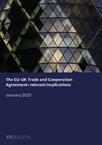
The EU-UK Trade and Cooperation Agreement: relevant implications
On 24 December 2020, negotiations between the European Union and the United Kingdom lead to the conclusion of the EU-UK Trade and Cooperation Agreement (EU-UK TCA). The EU-UK TCA provisionally entered into force as of 1 January 2021 pending its full ratification by the EU parliament.
In this article we outline the most important Belgian consequences for Customs, VAT, Corporate income tax and Global Mobility Services.
Customs
- The trade deal will not release companies from the obligation to file customs declaration at the borders.
- Tariff-free and quota-free access for products traded between the EU and UK will be subject to the condition that products are of either EU or UK preferential origin. The assessment of the preferential origin is crucial for tariff-free and quota free access. An EU-exporter can be registered as Registered Exporter System (REX) and confirm the preferential origin. In case of UK imports the assessment by importers will also be accepted.
- When no custom duties are due, the EU exporter is not obliged to provide the preferential origin assessment.
- Products which cannot be considered as originating from the EU or UK do not qualify for preferential treatment under the EU-UK TCA.
- Specific annexes were agreed to reduce the non-tariff barriers for medical products, automotive, chemical products, organic products and wine.
VAT
- The UK is now treated as a 3rd country for VAT purposes. As a result, different tax treatments apply and operations need to be executed differently. Your IT and SAP systems are at the core of your operations and need to be ready to support the new VAT and customs regulations. Some simplified schemes within the EU are no longer applicable for UK taxable persons.
- Although considered as a 3rd country, UK established companies can opt for direct VAT registration or registration by appointing a fiscal representative.
- In the UK, EU based companies can only apply for a direct VAT registration.
- The rules regarding intracommunity supplies are no longer applicable for movement of goods and services between the UK and EU and vice versa.
- Goods crossing the border need to be imported. VAT becomes due the moment of importation although many countries foresee a deferral regime – in Belgium this is a so-called ET 14000 license. Businesses moving goods will now need two EORI numbers.
- The UK has also introduced an import VAT deferral scheme so no cash VAT payment has to be made by business importers to UK customs.
- Rules regarding distance sales are no longer applicable in the UK. Also rules regarding call-off stock, digital services, the Mini-One-Stop-Shop (MOSS) are no longer applicable in the UK. EU businesses will have to register much more for VAT purposes in UK.
- Future simplified rules within the EU regarding e-commerce and the One-Stop-Shop (OSS) will not be applicable for UK businesses.
- UK businesses incurring EU VAT on travel, hotel or other expenses are no longer able to use the 8th Directive online VAT reclaim system operated via HMRC. Instead, they must use the 13th Directive paper-based reclaim process. This requires individual claims to each country where there is a VAT claim. Last UK claims via the 8th Directive will have to be submitted for the final quarter of 2021.
- Northern Ireland (NI) is now in a special VAT and customs relationship with the EU. Whilst NI remains within the UK VAT area, it tracks EU rules, including zero-rating for VAT on intra-community supplies across the Irish border. EU VAT on imports into Ireland via Northern Ireland are collected by the UK authorities.
- Intrastat reporting after Brexit is still required for 2021 for arrivals / imports into the UK from the EU. But they will not be required for dispatches / exports to the EU.
Corporate income tax
- From 1 January 2021, EU law including Directives, Regulations and the CJEU decisions should in principle no longer be applicable in the UK. This implies that in case of restructurings whereby UK companies are involved, the EU Merger Directive will possibly not apply.
- In particular, taxpayers should asses situations including the application of the EU Parent-Subsidiary (dividends and liquidation bonus) and the EU Interest and Royalties Directive as from now they should rely on the UK – Belgian double tax treaty for the avoidance of double taxation (resulting in other treaty based formalities, including more administrative burden).
- Following the UK / EU Trade and Cooperation Agreement, the UK has decided to devise its own reporting of cross border arrangements to conform with OECD agreed standards and rules, while retaining a requirement to report in line with its previous EU DAC6 rules only those arrangements where hallmarks D1 or D2 concerning the frustration of beneficial ownership reporting are present. It is still necessary to consider whether there is any EU DAC6 reporting requirement in any other EU member state, according to the rules in that member state.
Global Mobility Services
- No work is permitted, and anyone wishing to work must obtain the relevant employment authorisation and visa before travelling. As an employer, you will need to ensure that you know where your employees are and that they have the right to reside and work in the countries they are in.
- The EU Regulation (EC) 883/2004, which coordinates the social security contributions across the EU, no longer applies. However, the Protocol to the EU-UK TCA states that persons to whom the Protocol applies will be subject to the legislation of one State only. In principle, the Protocol rules follow the principles of the EU Regulation (EC) 883/2004 with some deviations. For employment relationships that existed before 31 December 2020 and continue without interruption, the beneficiary status under the withdrawal agreement will remain valid, respecting and applying the rules under EC 883/2004.
- Free movement of persons no longer applies. Accordingly, EEA and Swiss nationals need to qualify for status under either the new Points-Based Immigration system or the EU Settlement Scheme. The deadline for applications to the EU Settlement Scheme (EUSS) is 30 June 2021. However, it is recommended that eligible individuals apply as soon as possible to ensure they have the relevant documentation to show their residence in the UK.
- EEA and Swiss employees employed before 30 June 2021 can continue to evidence their right to work through the use of their passports or National ID cards. Alternatively, EEA and Swiss citizens who have status under the EU Settlement Scheme or under the Points-Based Immigration System may choose to evidence their right to work through the Home Office’s online verification system.
- There is a visit limit of 90 days in a 180 day period for short term visits between the UK and the EU. This will cover conferences, meetings, trade shows and customer and supplier negotiations.

